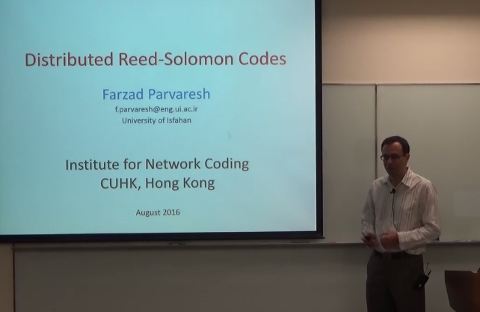
For a Reed-Solomon code of length n and dimension k, assume that the k information symbols are distributed in a network, and we have n encoders, such that, each one encodes one of the n symbols of the corresponding Reed-Solomon codeword. Each encoder has only access to a subset of k information symbols and not to all the k information symbols. We are interested to know when the encoders are able to encode the input messages to the corresponding Reed-Solomon codewords. Distributed Reed-Solomon codes can be used to send information over a simple multiple access network (SMAN) with adversaries. For a SMAN with at most three sources, Halbawi et al. show that one can always construct a distributed Reed-Solomon code that corrects up to z adversarial links, whenever the transmission rates are inside the capacity region of SMAN. In this talk, we investigate the existence of distributed Reed-Solomon codes when there are more than three sources in the network.
Farzad Parvaresh is currently an Assistant Professor in the Department of Electrical Engineering, University of Isfahan, Isfahan, Iran. He received the Ph.D. and M.S. degrees both in electrical and computer engineering from the University of California, San Diego in 2003 and 2007 respectively. Prior to that, he obtained his B.S. in electrical engineering from the Sharif University of Technology, Tehran, Iran in 2001. He was a postdoctoral scholar in the Center for Mathematics of Information (CMI) at the California Institute of Technology, Pasadena, CA during 2007–2008 and a visiting researcher in the Information Theory Research Group at Hewlett-Packard Laboratories, Palo Alto, CA during 2010–2012. His current research interests are in the areas related to coding theory, information theory and wireless communication networks.
Dr. Parvaresh received the best paper award from the 46th annual IEEE symposium on Foundations of Computer Science (FOCS) in 2005, and awarded the Silver medal in the 28th International Physics Olympiad in 1997.
